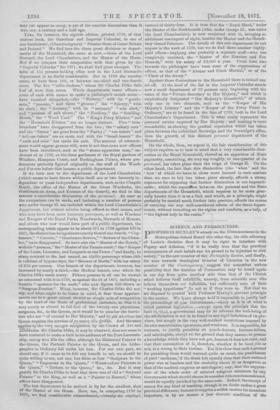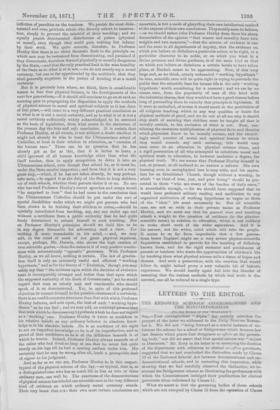SCIENCE AND PE4SECUTION.
pROFESSOR FIUXLEY'S attack' on the Ultramontanes in the Metropolitan School Board tke other day, his able advocacy of Locke's doctrine that it may' be right to interfere with Popery and Atheism, "if it be a' eally true that the practical consequences of such beliefs can be proved to be injurious to civil society," in the new number of the: Fortnightly Review, and finally, his tone towards theological tbzeories of Creation in the new number of the Contemporary,‘, suggest the somewhat serious possibility that the doctrine of Persecution may be heard again in our day from quite anotiaer side than that of the Church which believes itself infallibTe, namely, from scientific men who believe themselves not isitallible, but sufficiently sure of their " working hypotheses" ;ito act as if they were so. Not that we are disposed to quarrel with Professor Huxley's abstract principle in the matter. We have always held it impossible to justify half the proceedings of o'er Government,—chary as it is of what is called paternal leakestion,—except upon the principle that the limit tteasliets a government may do to advance the well-being of the whole nation is not to be found in any rigid definition of its pro- vince, but simply in the very well-marked restrictions imposed by its own uncertainties, ignorance, and weakness. It is impossible, for instance, to justify penalties on quack-doctors, fortune-tellers, and astrologists, except on the ground that they assume to possess a knowledge which they have not got, because it does not exist, and that their assumption of it, therefore, whether it be bond fide or not, is a wrong to their victims. Yet it is clear that such a ground for punishing them would warrant quite as much the punishment of paid mediums,' if the State felt equally clear that their assumed power was as baseless and the credulity about it as dangerous SS that of the medical empirics or astrologers ; nay, that the suppres- sion of the whole order of salaried religious ministers by any Government which should choose to consider Atheism demonstrated, would be equally justified by the same rule. Indeed, the receipt of money for any kind of teaching, though it no doubt makes a great practical difference, because it supplies a selfish motive for conscious imposture, is by no means a just theoretic condition of the
infliction of penalties on the teachers. We punish the most disin- I tereeted anti even patriotic rebels who directly exhort to insurrec- tion, simply to prevent the mischief of their teaching ; and we equally punish disinterested distributors of poison (physical or moral), even though they could gain nothing but infamy by their work. We quite concede, therefore, to Professor Huxley that there is no strict theoretic limit to the principle on which men may be restrained from disseminating, and punished if they disseminate, doctrines deemed physically or morally dangerous by the State,—and that the only practical limit is the wise humility of the State as to what is or is not,—we do not merely say a moral certainty, but one so far apprehended by the multitude that they shall generally acquiesce in the justice of treating it as a moral certainty.
But it is precisely here whore, we think, there is considerable reason to fear that physical Science, in the developments of the next few generations,—if it should still continue to go on at such an amazing pace in propagating the disposition to apply the methods of physical science to moral and spiritual subjects as it has done of late years,—will come to a very different practical conclusion as to what is or is not is moral certainty, and as to what is or is not a moral certainty sufficiently widely acknowledged to be assumed as the basis of legislation, from what seems to the statesmen of the present day the true and safe conclusion. It is certain that Professor Huxley, at all events, is not without a doubt whether it might not already be wise to treat the Ultramontane school of Catholics, at least in their relation to education, as " enemies of the human race." There can be no question that he has already got as far as this, that it is better to leave a child ignorant of all human knowledge other than what life itself teaches, than to apply compulsion to drive it into an Ultramontane school, even though that school be, as it must be, under the State secular inspection ; and from that it is not a very great step,—which, if he has not taken already, he may perhaps take soon,—to regard it as the duty of the State to keep children out of such schools, whether their parents desire it or no. No one who has read Professor Huxley's recent speeches and essays would "be surprised to hear" that he had come to the conclusion that the Ultramontane Catholics should be put under the sort of special disabilities under which we might put parents who had beau shown to be training their children to crime,—should be specially interdicted from teaching, say, any one under age and without a certificate from a seublic authority that he had quite freely determined to submit himself to such teaching. Nor on Professor Huxley's; principles should we hold him to be in any degree blameable for advocating such a view. For nothing re more remarkable in his mind, — and, we may add, in the mind of most of our great physical inquirers, except, perhaps, Mr. Darwin, who shows the high caution of true scientific genius,—than the union in it of very positive conclu- sions with ostentatiously "agnostic" premisses. With Professor Huxley, as we all know, nothing is certain. The law of gravita- tion itself is only an extremely useful and efficient "working hypothesis," and as for the theory of "Evolution," though you may safely say that "the evidence upon which the doctrine of evolution
rests is incomparably stronger and better than that upon which the supposed authority of the Book of Genesis rests," yet he would regard that man as utterly rash and unscientific who should speak of it as demonstrated. Yet, in spite of this profound objection to commit himself to the possible existence of a certainty, there is no confidence more strenuous then that with which Professor Huxley believes, and acts upon, the best of such "working hypo- theses" as he can find ; and we may add, no contempt greater than that with which he dismisses any hypothesis which he does not regard
as a ' working ' one. Professor Huxley is twice as confident in his relative beliefs as any ordinary believer in absolute know- ledge is in.ltis absolute beliefs. He is as confident of his right to act on imperfect knotvledgo as he is of its imperfection, and as
proud of that confidence as he is of the diffidence beneath it of which he boasts. Indeed, Professor Huxley always reminds us of the sailor who had lived so long at sea that ho never felt quite
steady on his legs till he had a moving surface under him. His certainty that he may be wrong after all, lends a perceptible dash of vigour to his judgment. And as far as we can see, Professor Huxley is, in this respect, typical of the physical science of the day,—as typical, that is, as a distinguished man who has as much life in him as two or three
ordinary men, can well be. The exactness of the demonstrations of physical science has blinded our scientific men to the very different kind of evidence on which ordinary moral certainty stands. Their very boast that 0131 their own most certain coucluaions are uncertain, is but a mode of gloryifing their own intellectual method at the expense of their own conclusions. They meetly seetn to believe, —as we should rather infer Professor Huxley does, from his sharp denunciation of the opinion "that reason and morality have two weights and two measures,"—that the science of evidence is one and the same in all departments of inquiry, that the evidence on
which you believe or disbelieve a particular action to be right, or a particular character to be noble, or on which you trust in a
divine presence and divine guidance, is of the same kind as that on which you believe or disbelieve a certain battle to have taken place, or Encke's comet to be approaching. Now, if this very
largo and, as we think, utterly unfounded "working hypothesis" be true, scientific men will be quite right in trying to persuade the public that the scientific base for human life is the only 'working hypothesis' worth considering for a moment ; and we are by no means sure, from the popularity of men of this kind with the industrial classes, that they would not have a good chance before long of persuading them to embody that principle in legislation. If it were so embodied, of course it would result in the prohibition of all religious teaching which in any way qualifies or limits the physical methods of proof, and we do not at all see why it should stop short of securing that children must be taught all that is morally certain, to the exclusion of what is not. Now, con- sidering the enormous multiplication of physical facts and theories which physicists know to be morally certain, and the exceed- ingly small number of moral and spiritual lessons to which they would concede any such certainty, this would very soon come to an education in physical science alone, and a rigid persecution of all who attempted to substitute moral and spiritual truth in education, in however moderate a degree, for physical truth. We are aware that Professor Huxley himself is not, at present, at all inclined to so narrow a culture. His own learning even in metaphysical lore is very wide, and his aspira- tion for an Established Church, though without a worship, in which "an ideal of true, just, and pure living" should be pre- sented to those "who are weary of the burden of daily cares," is remarkable enough, — for we should have supposed that he would have preferred solitary reading and meditation to any organized cultivation of working hypotheses so vague ne those of the " ideal " life must necessarily be. But all scientific men are not so wide in their private tastes as Professor Huxley, and we must say that his general view and teaching attach a weight to the question of evidence (in the physico- scientiac sense) in relation to education, which is not unlikely to make short work of his wider aspirations. And it ist his narrow, not his wider, mind which will take the people. It seems to us far from improbable that a few genera- tions hence England might see a very severe physioo-scientifie Inquisition established to provide for the teaching of definitely known facts, and for the rigid restraint and punishment of parents or teachers who waste the opportunities of children's life by teaching them what physical science calls a tissue of hopes and dreams. And such a persecution, with the reaction that would follow it, might indeed prove a very valuable bit of historic experience. We should hardly again fail into the blunder of assuming that the various methods by which real truth is dis- covered, can all be reduced to a single type.



































 Previous page
Previous page